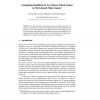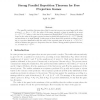1410 search results - page 3 / 282 » The Algorithmics of Solitaire-Like Games |
104
Voted
CAV
2007
Springer
15 years 8 months ago
2007
Springer
Three-color parity games capture the disjunction of a B¨uchi and a co-B¨uchi condition. The most efficient known algorithm for these games is the progress measures algorithm by ...
148
Voted
FORMATS
2010
Springer
15 years 17 days ago
2010
Springer
We study two-player timed games where the objectives of the two players are not opposite. We focus on the standard notion of Nash equilibrium and propose a series of transformation...
126
Voted
SAGT
2010
Springer
15 years 29 days ago
2010
Springer
The solution to a Nash or a nonsymmetric bargaining game is obtained by maximizing a concave function over a convex set, i.e., it is the solution to a convex program. We show that...
129
click to vote
APPROX
2009
Springer
15 years 9 months ago
2009
Springer
The parallel repetition theorem states that for any two provers one round game with value at most 1 − (for < 1/2), the value of the game repeated n times in parallel is at mo...
122
click to vote
SIGECOM
2006
ACM
15 years 8 months ago
2006
ACM
Finding an equilibrium of an extensive form game of imperfect information is a fundamental problem in computational game theory, but current techniques do not scale to large games...


